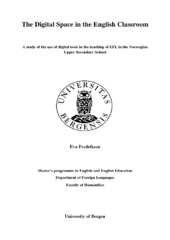The Digital space in the English classroom. A study of the use of digital tools in the teaching of EFL in the Norwegian Upper Secondary School.
Master thesis
Permanent lenke
https://hdl.handle.net/1956/12339Utgivelsesdato
2016-05-11Metadata
Vis full innførselSamlinger
Sammendrag
This study aims to say something about the difference between teachers of EFL in upper secondary when it comes to digital skills and the use of digital tools. It will also look at the differences between the counties as a school owner when it comes to providing the teachers with proper training in the use of digital tools. It will further look at the expectations the school owners has to its teachers when it comes to the use of digital tools when teaching. Considering that the current curricula recognises digital skills as one of five basic skills in the Norwegian school, one should expect that the pupils meet teachers who feel safe enough in their use of digital tools to use it as a pedagogical tool in the teaching of English. Instead, many pupils meet teachers who have a lower digital competence than they do, in addition to the fact that they have to use digital equipment that is outdated. This is a consequence of the economy of the counties, as well as the priorities of the schools. The study shows that there are differences not only between the schools, but between schools within the same counties as well. There is no set common practice making sure that all pupils receive the same training in English when it comes to digital tools. Not even pupils within the same county receive the same training. The digital training of teachers is mostly up to themselves, or to more digital competent colleagues. All pupils are to fulfil the same aims in the national curriculum, and they have to do so with help from teachers where there are no national or county requirements what so ever. Denne studien har som mål å seie noko om forskjellen mellom engelsklærarne i den vidaregåande skulen når det gjeld digitale ferdigheiter og bruken av digitale verktøy. Den vil også sjå på forskjellane mellom fylka som skuleeigar når det gjeld å gje lærarane opplæring i bruken av digitale verktøy, i tillegg til å sjå på kva forventningar skuleeigar stiller til sine lærarar når det gjeld bruken av digitale verktøy i undervisninga. Med tanke på at dagens læreplanverk framhevar digitale ferdigheiter som ein av fem grunnleggande ferdigheiter i norsk skule, burde ein forvente at elevane møter lærarar som er trygge nok i bruken av digitale verktøy til å kunne la det vere eit pedagogisk verktøy elevane kan bruke i innlæringa av engelsk. I staden møter mange elevar lærarar som har ein langt lågare digital kompetanse enn dei sjølve, i tillegg til at dei gjerne må bruke digitale verktøy som ikkje lenger er moderne. Dette heng saman med fylka sin økonomi, og skulane sine prioriteringar. Studien viser at ein finn forskjellar frå skule til skule, også innan fylka. Det eksisterer ikkje noko felles, overordna praksis som gjer at alle elevar får engelskopplæring på same vilkår når det gjeld bruken av digitale verktøy. Ikkje ein gong elevar innan same fylke får den same opplæringa. I alt for stor grad er den digitale opplæringa av lærarane opp til dei sjølve, eller til meir digitalt kompetente kollegaer. Alle elevar skal fylle dei same krava stilt i ein nasjonal læreplan, og dei skal nå dei måla med hjelp av ein lærarstand der det ikkje vert stilt noko nasjonale eller fylkeskommunale krav i det heile.
Utgiver
The University of BergenOpphavsrett
Copyright the author. All rights reservedBeslektede innførsler
Viser innførsler beslektet ved tittel, forfatter og emneord.
-
Readtheory.org – the theory of 21st-century reading: fostering 21st-century reading skills through digital competence, digital teaching aids and frequent digital teaching.
Mo-Bjørkelund, Rune (Master thesis, 2020-12-12)Digitalisering i den norske skulen er synleg – og engelskfaget er ikkje eit unntak. Det engelske språket er vårt verktøy for kommunikasjon med store delar av verda gjennom internet og digitale platformar – å kunne lese ... -
Digital influence, digital platforms and disconnected presence : Long-form leisure reading in the era of ubiquitous digital connectivity
Spjeldnæs, Kari (Doctoral thesis, 2023-11-24)Avhandlingen utforsker hva digitalisering gjør med lesing og utgivelse av litteratur som leses for sin egen del. Det handler om langlesing av litteratur for allmennmarkedet og hvordan kontinuerlig digital påkobing preger ... -
The relationship between metacognitive experiences and learning: Is there a difference between digital and non-digital study media?
Norman, Elisabeth; Furnes, Bjarte Reidar (Peer reviewed; Journal article, 2016-01)Technological development has influenced the ways in which learning and reading takes place, and a variety of technological tools now supplement and partly replace paper books. Previous studies have suggested that digital ...
